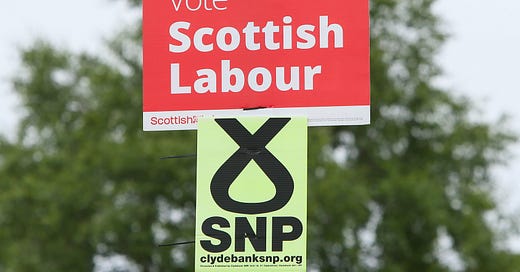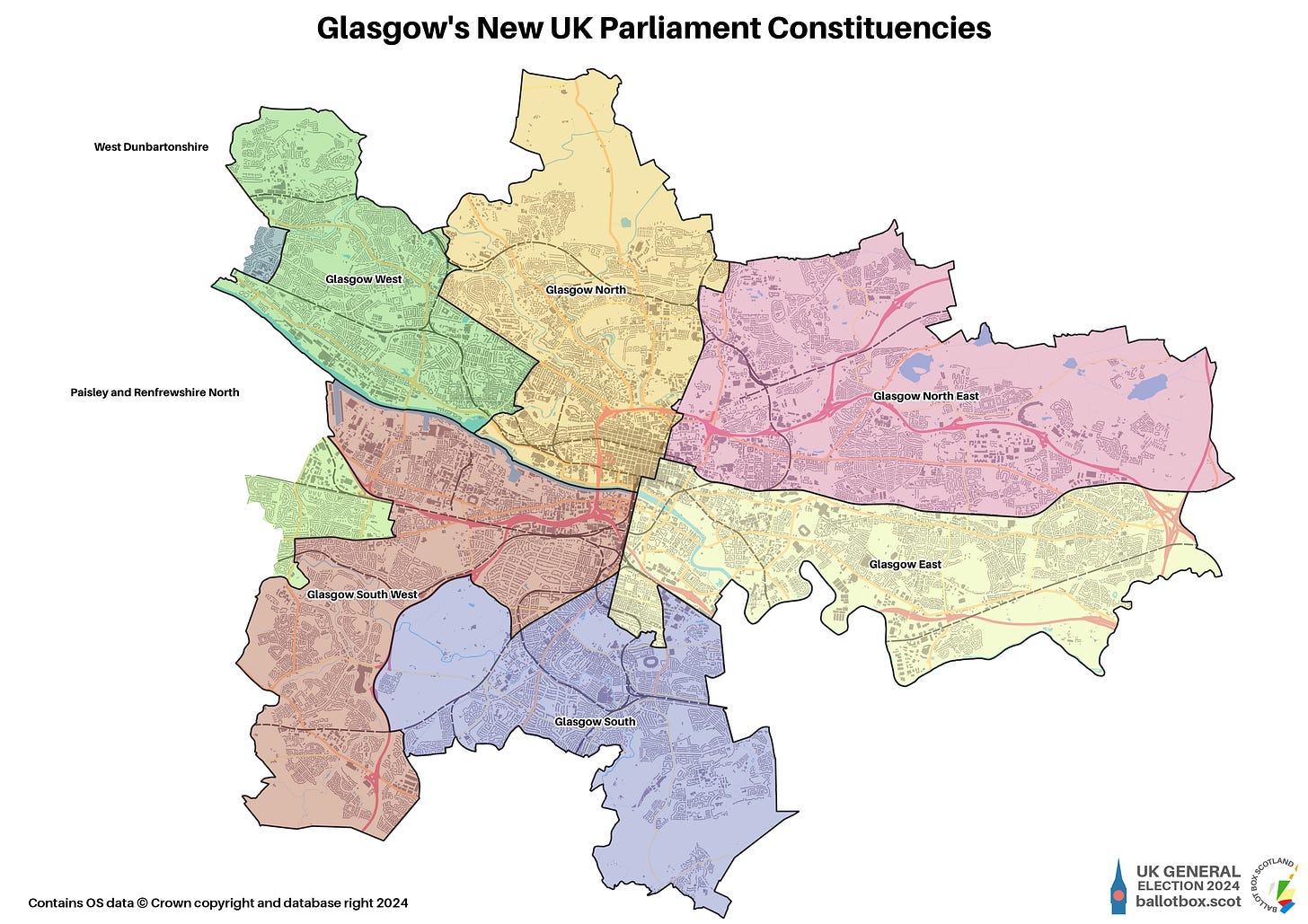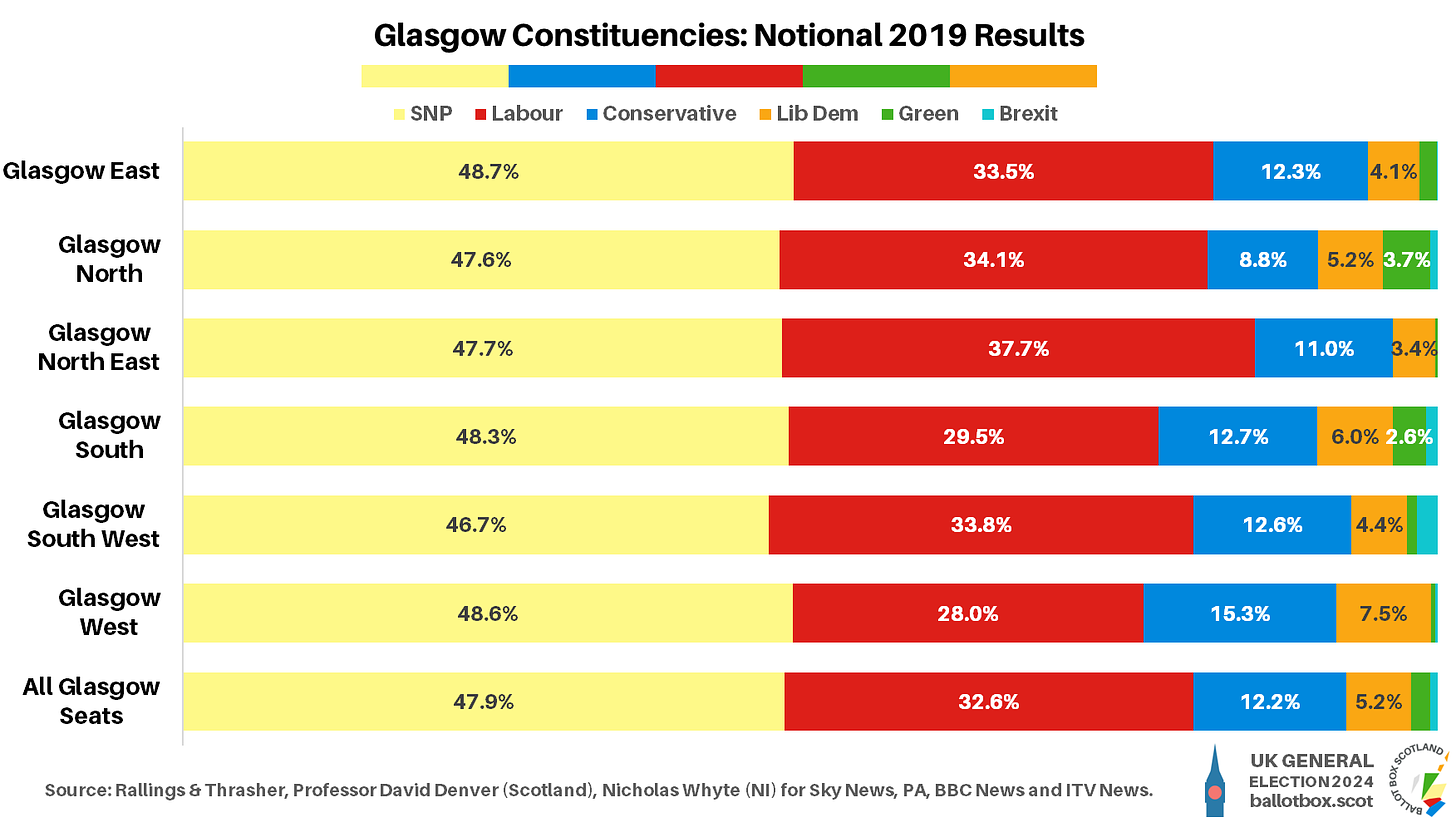Introducing our new Sunday Edition 📰 June 23 2024
This week, Allan from Ballot Box Scotland writes about the state of play in Glasgow ahead of the General Election on July 4.
🎉 Welcome to the first Sunday edition of The Glasgow Wrap. Each week, we will be bringing you an exclusive, captivating and in-depth local news story free from clickbait, ads, hyperbole, auto-playing videos or pop-ups. This high-quality Glasgow-focused journalism special will soon be reserved for our paid members - upgrading to paid is the best way to support The Wrap and help us grow the platform. Covering stories that matter to you is a top priority to me, so please send in any feedback you have about The Wrap (I love hearing from you!). The daily newsletter will always be free but I look forward to bringing you more top-tier Glasgow reporting, from myself and other talented local journalists. This week, Allan Faulds of Ballot Box Scotland has written an in-depth state of play on Glasgow ahead of the upcoming General Election on July 4. -
, Newsletter Editor.🗳 How are things shaping up in Glasgow ahead of the General Election?
As Scotland’s biggest (and best) city, Glasgow is often seen as the big prize at election time. Doing well here gives you a healthy helping of votes and seats, as well as heaps of media attention. With the SNP defending every seat in the city and Labour looking for their big Scottish revival, this year it feels even more important than usual. So, with just a few days left until the election, how are things shaping up in Glasgow?
The first thing many voters might notice this year is that your constituency is different, or has at least changed name. That’s because boundaries have been reviewed and redrawn since the last election. This has to happen every so often as the population changes, to try and make sure every constituency has roughly the same number of voters.
Previously Glasgow had seven MPs, but that’s dropped to six this time, with the old Glasgow Central constituency completely wiped from the map. In fact, some won’t even be voting in a Glasgow constituency at all. If you live in a little slice of Yoker, you’ll be voting for the West Dunbartonshire seat, whilst the good people of Cardonald, Hillington, Penilee and Crookston will be electing the MP for Paisley and Renfrewshire North.
Importantly, the boundaries of the City Council haven’t changed at all. It’s just that the city isn’t quite big enough for seven seats anymore, but too big to squeeze into six. That’s one of the problems with the First Past the Post voting system. It promises us “local” representation, but squaring that with equality of representation is difficult. Nowhere divides naturally into equally sized chunks, so we always end up with some weird shapes.
Mapping peculiarities aside, when it comes to elections to the UK Parliament Glasgow has tended to move as a single bloc. Of the eight UK general elections of my lifetime, seven have seen a single party win every seat in the city. Historically that was Labour, who were so dominant that we used to talk about their vote being weighed rather than counted. That of course all changed in 2015. The SNP won a jaw-dropping 56 of Scotland’s then-59 constituencies, turning the whole city yellow for the first time. Glasgow’s bloc-voting habit was briefly broken in 2017 when Labour won the Glasgow North East seat, but the SNP picked it right back up in 2019.
Going into this election, on the traditional measure all of the Glasgow constituencies would qualify as “safe”. Majorities on the new boundaries range from a smidge over 10% for Anne McLaughlin in Glasgow North East to nearly 21% for Carol Monaghan in Glasgow West. Yet this is an election in which “safe seat” means less than nothing for the parties of government on either side of the border.
After nearly two decades in power and an especially tumultuous time over the past 18 months, including the sudden downfall of First Minister Humza Yousaf, the SNP are in trouble. On average polls in Scotland are showing a 15% swing from the SNP to Labour, more than enough for Labour to win every seat in the city. Prospects are even worse for the SNP when you consider that as Labour barely exist in rural Scotland, the increase in their vote share is likely to be even higher in Glasgow and the rest of the urban Central Belt.
Although we can never be certain about elections, It looks highly likely that a single-party tide will once again roll across Glasgow. A resurgent Labour turfing out all six sitting SNP MPs will certainly be cause for celebration for the party’s activists and supporters after more than a decade of crushing defeats. For the SNP, the devastation will be equally intensely felt. And for journalists, commentators, and punters watching at home, it’ll certainly make for dramatic viewing.
Once all the dust has settled though, we should ask ourselves something: does near-constantly sending a single party delegation to Westminster really reflect our city, even if we occasionally change what party it is? Glasgow isn’t just Scotland’s biggest city, it’s the most diverse. People of all ages, nationalities, ethnic backgrounds, faiths and political views are proud to call Glasgow their home. How can one party truly represent that?
Although Glasgow famously voted for Independence in 2014, it wasn’t unanimous. Yet for most of the period since the referendum, there wasn’t a single voice for the city’s Pro-Union residents at Westminster. After this election, it’s likely to be the Pro-Independence side going unheard, albeit the constitution feels much less salient in this election than at any point in the past decade. Quite apart from the constitution, if you’re one of the many people who will vote for a party other than Labour or the SNP, you haven’t got any hope whatsoever of electing someone to represent you. Even worse, knowing that is the case means many voters feel they can’t even vote for the party they truly support, voting tactically instead.
Contrast that with our representation in the Scottish Parliament. Sure, the SNP won all eight constituencies in the city in 2021, but those aren’t the only MSPs we have. A further seven proportionally elected MSPs – four for Labour, two for the Conservatives, and one for the Greens – mean that at Holyrood almost 95% of Glasgow’s voters have at least some representation. That is a much fairer and more accurate reflection of what our city actually thinks.
As we look ahead to the near-certain Labour UK Government after this election, it’s worth reflecting on the fact their manifesto cover features just one word: “Change”. For the UK’s antiquated and unrepresentative voting system, that change is certainly long overdue.
You can find a full list of 2019 results and candidates for the 2024 General Election in your constituency on the Ballot Box Scotland website.
Allan Faulds, Ballot Box Scotland
Thank you for reading the FIRST Sunday edition of The Glasgow Wrap. Consider upgrading to paid if you want to continue receiving our weekly reporting special (the daily newsletter will always be free). And if you have a story for us or want me to investigate something for you, please get in touch via form or email.








